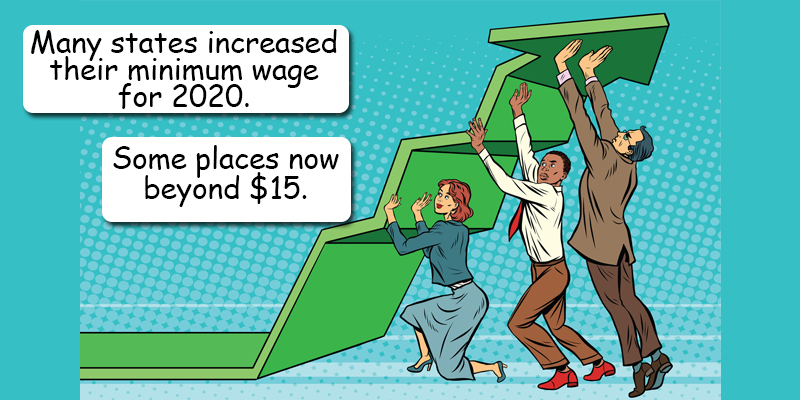State Minimum Wage Increases 2020
While the Federal minimum wage remains at $7.25 per hour,many states and cities/locals have set increases effective January 1st, 2020 with a few announcing a change during 2020, and New York with a December 31st, 2019 increase. A list of each state/local, along with the new hourly rate is listed below;

All rates are effective January 1st, 2020 unless otherwise noted.
- Alaska: $10.19
- Arizona: $12.00 ($9.00 for tipped employees)
- Arkansas: $10.00 (tipped minimum wage will remain at $2.63)
- California: $13.00 for businesses with 26 or more employees, and $12.00 for 25 or less;
About Us!
-
- Cities marked with an * below will have a rate increase this summer and the rate is not determined a the time of this publishing.
- Alameda: (7/1/2019) $13.50*
- Belmont: (7/1/2019) $13.50*
- Berkley: $15.59*
- Cupertino: $15.35
- Daly City: $13.75
- El Cerrito: $15.37
- Emeryville: (7/1/2019) $16.30*
- Freemont: (7/1/2019) $13.50*
- Los Altos: $15.40
- Los Angeles: (7/1/2019) $14.25 for businesses with 26 or more employees; $13.25 for businesses with 25 or fewer employees*
- Malibu: (7/1/2019) $14.25 for businesses with 26 or more employees; $13.25 for businesses with 25 or fewer employees*
- Menlo Park: $15.00
- Milpitas: (7/1/2019) $15.00*
- Mountain View: $16.05
- Oakland: $14.14
- Palo Alto: $15.40
- Pasadena: (7/1/2019) $14.25*
- Petaluma: $15.00 for employers with 26 or more employees; $14.00 with 25 or fewer
- Redwood: $15.38
- Richmond: $15.00
- Sacramento: $11.75
- San Diego: $13
- San Francisco: (7/1/2019) $15.59*
- San Jose: $15.25
- San Leandro: (7/1/2019) $14.00*
- San Mateo: $15.38 for standard businesses; $15.38 for non-profits
- Santa Clara: $15.40
- Santa Monica: (7/1/2019) $14.25 for businesses with 26 or more employees; $13.25 for businesses with 25 or fewer employees*
- Sonoma: $13.50 for businesses with 26 or more employees; $12.50 for businesses with 25 or fewer employees
- South San Francisco: $15.00
- Sunnyvale: $16.05
- Colorado: $12.00 ($9.98 for tipped employees)
- Connecticut: $11.00 (October 1, 2019); $12.00 (September 1, 2020)
- Delaware: $9.25
- District of Columbia: $15.00
- Florida: $8.56 ($5.54 for tipped employees)
- Guam: $8.75 (March 2020)
- Hawaii: $10.10
- Illinois $9.25 ($5.55 for tipped employees)
- Maine: $12.00 ($6.00 for tipped employees)
- Maryland $11.00 (Starting 2021 the state will have different rates for large/small employers)
- Massachusetts: $12.75 $4.95 for tipped employees)
- Michigan: $9.65 ($3.67 for tipped employees)
- Minnesota: $10.00 for businesses with annual gross revenue of $500,000 or more; $8.15 for businesses with annual gross revenue of less than $500,000
- Missouri: $9.45 ($4.73 for tipped employees)
- Montana: $8.65
- Nebraska: $9.00 (Change pending)
- Nevada: $9.00
- New Jersey: $11.00; $10.30 for seasonal, less than 6 employees, and agricultural employers
- New Mexico $9.00 ($2.35 for tipped employees)
-
New York: (12/31/2018) $11.80; $13.75 for fast food workers
- New York City: (12/31/2018) $13.50 for businesses with 10 or few employees; $15.00 for businesses with 11 or more; $15.00 for fast food workers
- Nassau, Suffolk, and Westchester Counties: (12/31/2018) $12.00
- Ohio: $8.70 for large employers; $7.25 for small employers ($4.35 for tipped employees)
- Oregon: $12.00 (July 2020) for non-rural counties; $12.50 Portland metro; $11.00 rural counties
- South Dakota: $9.30 ($4.65 for tipped employees)
- Vermont: $10.96 ($5.48 for tipped employees)
-
Washington (state): $13.50
- Seattle: $16.00 for businesses with 501 or more employees that don't offer medical benefits; $16.00 for businesses with 501 or more employees that do offer medical benefits; $15.00 for businesses with 500 or fewer employees that don't offer medical benefits; $12.00 for businesses with 500 or fewer employees that do offer medical benefits
- West Virginia : $9.50
A question we are often asked is in regards to the timing of the rate change. A rate change takes place on January 1st, means that it is for work performed on or after that date. It is not based on the date the wages are paid. For example, if your biweekly pay period is from 12/18/2019 to 12/31/2019, with a check date of January 5th, 2020, all of those hours worked would be paid at the 2019 rate, even though it is being paid in 2020. A situation occurs when your pay period straddles two different calendar years, and a few days needs to be paid at the old rate and a few days at the new. This may cause a nightmare of work if your timekeeping/payroll system cannot handle assigning rates based on the day worked. The easiest solution would be to pay the entire pay period at the new rate. Yes, one may see this as overpaying the employees, but in most cases the added administrative work involved may overshadow the additional wages paid. With Sunrise HCM time & labor and payroll, rates are assigned on a daily basis, so mid-pay period rate changes are never an issue.
The following 21 states are all remaining at the Federal minimum wage level of $7.25. A rate that has been in place since July 24th, 2009. Alabama, Georgia, Idaho, Indiana, Iowa, Kansas, Kentucky, Louisiana, Mississippi, New Hampshire, North Carolina, North Dakota, Oklahoma, Pennsylvania, South Carolina, Tennessee, Texas, Utah, Virginia, Wisconsin, Wyoming.
A final note. If your state has enacted a rate change, this means that you will need to update your state labor poster.
If your state is not listed, check with your state's department of labor to confirm there was no rate change for 2020. The data listed is for general informational purposes only and should not be used as legal or professional advice. Please contact your state and local agency for more information regarding your State Minimum Wage as well as any exceptions that may exist.